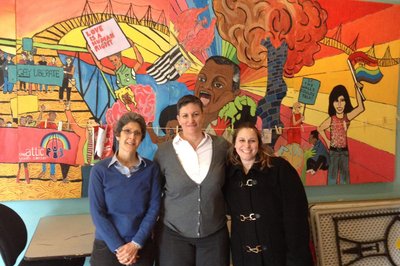The Philadelphia Consulate of Israel welcomed a special guest to its offices last week. Irit Zviely-Efrat, executive director of Israeli organization Hoshen, visited the office after a stint in the United States to advocate on behalf of LGBT youth and Hoshen services. Hoshen, which stands for the Hebrew acronym for education and change, is a leading information center for the LGBT community in Israel. The nonprofit group currently has more than 300 daily volunteers who work within Israel’s non-secular schools to create visibility for LGBT people and fight stereotypes, particularly by sharing personal stories. “By creating this platform for dialogue, we create a better environment through and for the LGBT community,” Zviely-Efrat said. “We are trying to increase the awareness and tolerance and make the students more like allies.” Zviely-Efrat said the organization, which was established in 2004, is the only LGBT group in Israel working outside of the LGBT community. She said the agency has significantly grown throughout its 10 years. “Five years ago, we reached 3-to-4 percent of secular high schools in Israel. Now we reach more than 15 percent of secular schools in Israel. We meet around 1,800 students a year,” she said. “We manage to create a community inside a community and we are creating change in the Israel education environment.” The organization has tripled its budget in recent years and gone from one employee to three. Zviely-Efrat said the group’s next goal is to create a year-round LGBT-friendly history and literature curriculum for students. Although the organization has had success in reaching secular students, Zviely-Efrat hopes to broaden its audience. “The Israeli school system is separated into religious and secular. We are quite confident in our secular work and in the next few years, we hope to increase our presence in both the Jewish religious education system and the Arab education system,” she said. Zviely-Efrat also hopes to reach out to the increasing number of Russian and Ethiopian immigrants. Hoshen currently has no Ethiopian volunteers and only one Russian volunteer. “We are trying to reach new immigrants and start a dialogue with them and someday we will have enough volunteers. We are very diverse and, working in Israel, you cannot just look at Israel as a whole. Israel has many layers and we are trying to reach as many layers.” Zviely-Efrat said the stories volunteers share are not only relatable for the LGBT community but for all individuals, regardless of sexual orientation or gender identity. “We talk about keeping secrets, feeling ashamed and feeling we have to hide any kind of identity, and these are things you don’t have to be LGBT to relate to. Talking about these kinds of issues increases the dialogue.” Telling such stories on a global level can help create a sense of community on an even broader scope, she said. “What I realized throughout the years is although we can live thousands of miles away from each other, we face the same challenges.” For more information on Hoshen, visit www.hoshen.org.
Newsletter Sign-up
